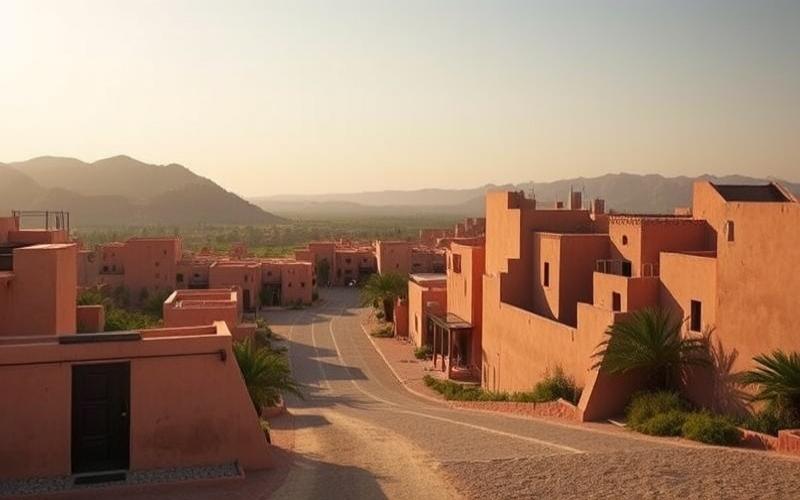
 Published on and written by Cyril Jarnias
Published on and written by Cyril Jarnias
Morocco offers a favorable environment for foreign investors looking to establish a business. However, it’s crucial to fully understand the costs associated with company formation in this country to effectively plan your entrepreneurial project. This article will guide you through the various expenses to anticipate and provide tips to optimize your budget.
Essentials: Administrative and Legal Fees
Establishing a company in Morocco involves several administrative procedures, each with its own cost:
Negative Certificate: This document, which confirms the uniqueness of your chosen company name, costs approximately 230 dirhams (about $23).
Drafting and Registration of Articles of Association: Fees vary depending on whether you hire a lawyer or an accountant. Budget between 3,000 and 5,000 dirhams ($300-$500) for professional drafting.
Registration Fees: These amount to 1.5% of the share capital, with a minimum of 1,000 dirhams ($100).
Commercial Registry Registration: Fees are approximately 350 dirhams ($35) for legal entities.
Legal Publication: Publishing the creation announcement in an official gazette costs between 200 and 300 dirhams ($20-$30).
Company Seal Creation: Budget approximately 150 dirhams ($15).
Good to Know:
These fees may vary slightly depending on the region and chosen service providers. It’s recommended to request precise quotes before committing.
Compliance Requirements: Regulatory Costs
Beyond registration fees, several expenses are necessary to ensure your company’s compliance:
CNSS Affiliation: Registration with the National Social Security Fund is free, but monthly contributions will be due once you hire employees.
Tax Identification Number: This procedure is free but essential for any commercial activity.
Business License: Depending on your industry, you might need specific authorizations with varying costs.
Professional Insurance: While not mandatory in all cases, it’s highly recommended. Rates depend on your activity and chosen coverage.
Good to Know:
Certain industries, such as manufacturing or tourism, may require additional permits. Check with the relevant authorities to avoid any surprises.
The Bottom Line: Initial Investment
The initial investment varies considerably depending on the type of company you wish to establish:
Minimum Share Capital: – LLC: No legal minimum (but sufficient capital is recommended) – Corporation: 300,000 dirhams (approximately $30,000)
Business Premises: Renting an office in a business district in Casablanca can cost between 100 and 200 dirhams/m²/month ($10-$20).
Equipment and Supplies: Budget for furniture, computers, and other equipment necessary for your operations.
Recruitment and Training: If you plan to hire from the start, include recruitment and training costs in your initial budget.
Good to Know:
Many free zones and industrial parks offer tax benefits and modern infrastructure. Explore these options to potentially reduce your initial costs.
Daily Operations: Anticipating Operational Expenses
Once your company is established, several recurring expenses should be anticipated:
Rent and Utilities: In addition to rent, budget for electricity, water, and internet expenses.
Salaries and Social Charges: The minimum wage in Morocco is approximately 2,800 dirhams/month ($280), but varies by sector. Don’t forget to add social charges (approximately 20-25% of gross salary).
Taxes and Duties: Corporate tax ranges from 10% to 31% depending on profit. Standard VAT is 20%.
Banking Fees: Budget between 100 and 300 dirhams/month ($10-$30) for a business account.
Accounting and Management: Outsourcing accounting can cost between 1,000 and 3,000 dirhams/month ($100-$300) depending on company size.
Good to Know:
Morocco has tax treaties with many countries, which can help avoid double taxation. Consult a tax expert to optimize your situation.
Budget Management: Tips to Reduce Costs
Here are some strategies to optimize your expenses during company formation and the first months of operation in Morocco:
Choose Business Address Services: Instead of renting offices, start with a registered business address. It’s less expensive and allows you to test your business before investing in premises.
Take Advantage of Government Incentives: Morocco offers various assistance programs for investors, particularly in priority sectors or geographic zones. Check with the Moroccan Investment Development Agency.
Hire Gradually: Start with a small team and increase your staff according to business growth.
Use Digital Tools: Many online solutions allow efficient management of accounting, invoicing, or customer relationships at lower costs.
Negotiate with Suppliers: Don’t hesitate to compare offers and negotiate rates, whether for equipment or recurring services.
Good to Know:
The self-employed status, although limited in terms of revenue, can be an interesting option to test your business before establishing a full company.
Conclusion
Establishing a company in Morocco represents a significant initial investment but offers excellent development opportunities. By properly anticipating the various costs and adopting an optimization strategy from the start, you’ll maximize your chances of success in this dynamic market.
Remember that each project is unique and costs can vary significantly depending on your industry, location, and ambitions. It’s always recommended to consult local professionals (accountants, business lawyers) to obtain personalized advice tailored to your specific situation.
Disclaimer: The information provided on this website is for informational purposes only and does not constitute financial, legal, or professional advice. We encourage you to consult qualified experts before making any investment, real estate, or expatriation decisions. Although we strive to maintain up-to-date and accurate information, we do not guarantee the completeness, accuracy, or timeliness of the proposed content. As investment and expatriation involve risks, we disclaim any liability for potential losses or damages arising from the use of this site. Your use of this site confirms your acceptance of these terms and your understanding of the associated risks.

















